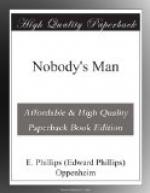“You of all men in the world need never ask yourself that,” she declared warmly. “Think of your lifelong devotion to your work. Think of the idlers by whom you are surrounded.”
“I work,” he admitted, “but I sometimes ask myself whether I work with the same motives as I did when I was young. I started life as an altruist. I am not sure now whether I am not working in self-defence, from habit, because I am afraid of falling behind.”
“You mean that you have lost your ideals?”
“I wonder,” he speculated, “whether any man can carry them through to my age and not be afflicted with doubts as to whether, after all, he has been on the right path, whether he may not have been worshipping false gods.”
“Tell me exactly how you started life,” she begged.
“Like any other third or fourth son of a bankrupt baronet,” he replied. “I went to Eaton and Oxford with the knowledge that I had to carve out my own career and my ambitions when I left the University were entirely personal. I chose diplomacy. I did moderately well, I believe. I remember my first really confidential mission,” he went on, with a faint smile, “brought me to Paris, where we met.—Then came Parliament—afterwards the war and a revolution in all my ideas. I suddenly saw the strength and power of England and realised whence it came. I realised that it was our democracy which was the backbone of the country. I realised the injustice of those centuries of class government. I plunged into my old socialistic studies, which I had taken up at Oxford more out of caprice than anything, and I began to have a vision of what I have always since looked upon as the truth. I began to realise that there was some super-divine truth in the equality of all humans, notwithstanding the cheap arguments against it; that by steady and broad-minded government for a generation or so, human beings would be born into the world under more level conditions; and with the fading away of class would be born or rather generated the real and wonderful spirit of freedom. My parliamentary career progressed by leaps and bounds, but when in ’15 the war began to go against us, I turned soldier.”
“You don’t need to tell me anything about that part of your career,” she interrupted, with a little smile almost of proprietory pride. “I never forget it.”
“When I came back,” he continued, “I was almost a fanatic. I worked not from the ranks of the Labour Party itself, because I flatter myself that I was clear-sighted enough to see that the Labour Party as it existed after the war, split up by factions, devoted to the selfish interests of the great trades unions and with the taint of Miller retarding all progress, had nothing in it of the real spirit of freedom. It was every man for his own betterment and the world in which he lived might go hang. I stayed with the Coalitionists, though I was often a thorn in their side, but because I was also useful to them I bent




